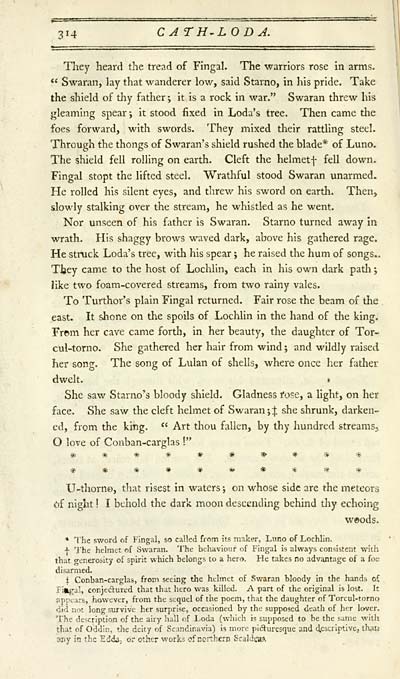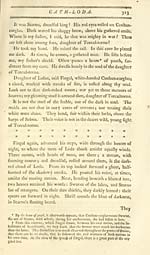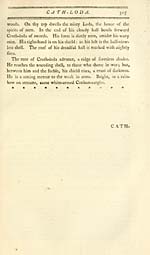Download files
Complete book:
Individual page:
Thumbnail gallery: Grid view | List view

314 CATH^LODA.
Tliey heard the tread of FIngal. The warriors rose in arms.
*' Swaran, lay that wanderer low, said Starno, in his pride. Take
the shield of thy father ; it is a rock in war." Swaran threw his
gleaming spear ; it stood fixed in Loda's tree. Then came the
foes forward, with swords. They mixed their rattling steel.
Through the thongs of Swaran's shield rushed the blade* of Luno.
The shield fell rolling on earth. Cleft the helmetf fell down.
Fingal stopt the lifted steel. Wrathful stood Swaran unarmed.
He rolled his silent eyes, and threw his sword on earth. Then,
slowly stalking over the stream, he whistled as he went.
Nor unseen of his father is Swaran. Starno turned away in
wrath. His shaggy brows waved dark, above his gathered rage.
He struck Loda's tree, with his spear 5 he raised the hum of songs..
They came to the host of Lochlin, each in his own dark path ;
like two foam-covered streams, from two rainy vales.
To Turthor's plain Fingal returned. Fair rose the beam of the
east. It shone on the spoils of Lochlin in the hand of the king.
From her cave came forth, in her beauty, the daughter of Tor-
cul-torno. She gathered her hair from wind ; and wildly raised
her song. The song of Lulan of shells, where once her father
dwelt. »
She saw Starno 's bloody shield. Gladness fose, a light, on her
face. She saw the cleft helmet of Swaran; J she shrunk, darken-
ed, from the king. " Art thou fallen, by thy liundred streams^
O love of Conban-carglas 1"
XJ-thorno, that risest in waters j on whose side are the meteors
of night ! I behold the dark moon descending behind thy echoing
vveods.
* The sword of Fingal, so called from Its maker, Limo of Lochlin.
f The helmet of Swaran. The behaviour of Fingal is always consistent with
that generosity of spirit which belongs to a hero. He takes no advantage of a foe
disarmed.
i Conban-carglas, from seeing the helmet of Swaran bloody in the hands of
Fiftgal, conjedured that that hero was killed. A part of the original is lost. It
appears, however, from the sequel of the poem, that the daughter of Torcul-torno
did not long survive her surprise, occasioned by the supposed death of her louver.
The description of the airy hall of Loda (wliich is supposed to be the same with
that of Oddin, the deity of Scandinavia) is more pidturesque and descriptive, thaii
OTy in the Edda, or other works cf northern ScaUca?*
Tliey heard the tread of FIngal. The warriors rose in arms.
*' Swaran, lay that wanderer low, said Starno, in his pride. Take
the shield of thy father ; it is a rock in war." Swaran threw his
gleaming spear ; it stood fixed in Loda's tree. Then came the
foes forward, with swords. They mixed their rattling steel.
Through the thongs of Swaran's shield rushed the blade* of Luno.
The shield fell rolling on earth. Cleft the helmetf fell down.
Fingal stopt the lifted steel. Wrathful stood Swaran unarmed.
He rolled his silent eyes, and threw his sword on earth. Then,
slowly stalking over the stream, he whistled as he went.
Nor unseen of his father is Swaran. Starno turned away in
wrath. His shaggy brows waved dark, above his gathered rage.
He struck Loda's tree, with his spear 5 he raised the hum of songs..
They came to the host of Lochlin, each in his own dark path ;
like two foam-covered streams, from two rainy vales.
To Turthor's plain Fingal returned. Fair rose the beam of the
east. It shone on the spoils of Lochlin in the hand of the king.
From her cave came forth, in her beauty, the daughter of Tor-
cul-torno. She gathered her hair from wind ; and wildly raised
her song. The song of Lulan of shells, where once her father
dwelt. »
She saw Starno 's bloody shield. Gladness fose, a light, on her
face. She saw the cleft helmet of Swaran; J she shrunk, darken-
ed, from the king. " Art thou fallen, by thy liundred streams^
O love of Conban-carglas 1"
XJ-thorno, that risest in waters j on whose side are the meteors
of night ! I behold the dark moon descending behind thy echoing
vveods.
* The sword of Fingal, so called from Its maker, Limo of Lochlin.
f The helmet of Swaran. The behaviour of Fingal is always consistent with
that generosity of spirit which belongs to a hero. He takes no advantage of a foe
disarmed.
i Conban-carglas, from seeing the helmet of Swaran bloody in the hands of
Fiftgal, conjedured that that hero was killed. A part of the original is lost. It
appears, however, from the sequel of the poem, that the daughter of Torcul-torno
did not long survive her surprise, occasioned by the supposed death of her louver.
The description of the airy hall of Loda (wliich is supposed to be the same with
that of Oddin, the deity of Scandinavia) is more pidturesque and descriptive, thaii
OTy in the Edda, or other works cf northern ScaUca?*
Set display mode to: Large image | Transcription
Images and transcriptions on this page, including medium image downloads, may be used under the Creative Commons Attribution 4.0 International Licence unless otherwise stated. ![]()
| Early Gaelic Book Collections > Ossian Collection > Poems of Ossian, the son of Fingal > (326) |
|---|
| Permanent URL | https://digital.nls.uk/77927137 |
|---|
| Description | Selected books from the Ossian Collection of 327 volumes, originally assembled by J. Norman Methven of Perth. Different editions and translations of James MacPherson's epic poem 'Ossian', some with a map of the 'Kingdom of Connor'. Also secondary material relating to Ossianic poetry and the Ossian controversy. |
|---|
| Description | Selected items from five 'Special and Named Printed Collections'. Includes books in Gaelic and other Celtic languages, works about the Gaels, their languages, literature, culture and history. |
|---|

